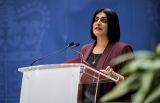Chocolate Benefits Blood Flow and Brain Health Late in Life
ByBlood flow to the brain helps problem solving and that becomes more difficult in old age, but scientists believe regular consumption of chocolate could remedy the problem, the Los Angeles Times reported.
The study, published Wednesday in Neurology, showed that chocolate is capable of sharpening the mind by stimulating blood flow to the brain. The researchers analyzed brain activity in memory and reasoning tests over the course of a month in the elderly.
At the beginning of the study, those with poor performances on the tests also had weakened blood flow, but showed improvements after drinking two cups of hot cocoa per day for a month.
The 60 participants were randomly given hot chocolate either rich or poor in flavanol, an ingredient believed to improve blood vessel and brain activity. The researchers found that those with poor cognitive test results to begin with benefitted from the chocolate diet, but it did nothing to help those with regular test scores.
About a third of the participants performed poorly on the cognitive tests and also had reduced blood flow. They showed about an eight percent increase in blood flow and were able to answer questions a minute faster at the end of the 30 days. Among those who started with regular blood flow and cognitive abilities, there was no significant change.
What surprised the researchers was that there was not a big difference in the results in the test subjects depending if they had falvanol-rich cocoa or flavanol-poor cocoa.
Lead author Dr. Farzaneh A. Sorond, a neurologist at Brigham and Women's Hospital in Boston, said her team plans to discover what ingredient in hot cocoa actually does help blood flow to the brain in further trials.
"By the time people develop these problems, it's too late to initiate the drugs we have," she said. "If we could diagnose them earlier, before they have clinical symptoms, using physiological markers ... maybe we could prevent the disease or lessen its impact."
The study had its shortcomings. The team used an ultrasound method that was not thorough enough to get accurate blood flow readings, but rather offered estimates. A precise reading would require a more invasive method.
"This was an easy way to get this information, but not the most accurate way," said Dr. Costantino Iadecola, a neurologist at Weill Cornell Medical College in New York City, who was not involved in the study
He also added the lasting effects of the hot cocoa were not measured and it is unknown how quickly they could ware off.
However, it is a step in the right direction because test participants also had to adopt a diet that would offset the sugar and fat intake of the chocolate. All told, the study may have further proved the key to sustainable and long-lasting health is a good diet and exercise.
© 2026 University Herald, All rights reserved. Do not reproduce without permission.








